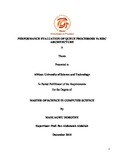Browsing by Title
Now showing items 3138-3157 of 4790
-
PEEK
(1974-02-01)PEEK is a utility program designed to operate under the ITS time sharing system. It enables a user to monitor a variety of aspects of the time sharing system by providing, to the user, various periodically updated displays.
-
PEEK and LOCK
(1968-11-01)This memo describes two small utility programs that are of assistance in using the ITS 1.4 (see A.I. 161, MAC-M-377) time sharing system. LOCK performs miscellaneous utility functions while PEEK displays, with periodic ...
-
Peer-to-peer systems for simple and flexible information sharing
(University of Cape TownFaculty of ScienceDepartment of Computer Science, 2009)Peer to peer computing (P2P) is an architecture that enables applications to access shared resources, with peers having similar capabilities and responsibilities. The ubiquity of P2P computing and its increasing adoption ...
-
People Recognition in Image Sequences by Supervised Learning
(2000-06-01)We describe a system that learns from examples to recognize people in images taken indoors. Images of people are represented by color-based and shape-based features. Recognition is carried out through combinations of Support ...
-
Perceiving Illumination Inconsistencies in Scenes
(2001-11-05)The human visual system is adept at detecting and encoding statistical regularities in its spatio-temporal environment. Here we report an unexpected failure of this ability in the context of perceiving inconsistencies in ...
-
The Perception of Subjective Surfaces
(1981-11-01)It is proposed that subjective contours are an artifact of the perception of natural three-dimensional surfaces. A recent theory of surface interpolation implies that "subjective surfaces" are constructed in the visual ...
-
Perceptions of cloud computing in the South African government
(University of Cape TownFaculty of ScienceDepartment of Computer Science, 2014)The South African government is unable to provide efficient Information Technology (IT) services to the citizens because of the fragmented approach in government where each department procures their own IT services and ...
-
The Perceptual Buildup of Three-Dimensional Structure from Motion
(1989-08-01)We present psychophysical experiments that measure the accuracy of perceived 3D structure derived from relative image motion. The experiments are motivated by Ullman's incremental rigidity scheme, which builds up 3D ...
-
Perceptual Evaluation of Video-Realistic Speech
(2003-02-28)abstract With many visual speech animation techniques now available, there is a clear need for systematic perceptual evaluation schemes. We describe here our scheme and its application to a new video-realistic ...
-
Perceptual Organization, Figure-Ground, Attention and Saliency
(1991-08-01)Notions of figure-ground, inside-outside are difficult to define in a computational sense, yet seem intuitively meaningful. We propose that "figure" is an attention-directed region of visual information processing, and ...
-
Perceptual refinement for hierarchical radiosity
(University of Cape TownFaculty of ScienceDepartment of Computer Science, 2000)This dissertation explores the use of a simple model of the human visual system to yield a performance improvement with hierarchical radiosity. Hierarchical radiosity is a physically based rendering algorithm and hence ...
-
Perceptually-based Comparison of Image Similarity Metrics
(2001-07-01)The image comparison operation ??sessing how well one image matches another ??rms a critical component of many image analysis systems and models of human visual processing. Two norms used commonly for this purpose are L1 ...
-
Perfect and General Virtual Implementation For Perfectly Informed Players
(2009-12-04)We show that, when the players are perfectly informed about each other, essentially all social-choice functions can be rationally robustly implemented via an extensive-form public-action mechanism that (1) is perfectly ...
-
Perfect Implementation of Normal-Form Mechanisms
(2005)Privacy and trust affect our strategic thinking, yet they have not been precisely modeled in mechanism design. In settings of incomplete information, traditional implementations of a normal-form mechanism ---by disregarding ...
-
Perfect Implementation of Normal-Form Mechanisms
(2007-03)Privacy and trust affect our strategic thinking, yet they have not been precisely modeled in mechanism design. In settings of incomplete information, traditional implementations of a normal-form mechanism ---by disregarding ...
-
Performance and error analysis of three part of speech taggers on health texts
(2010-02-25)Increasingly, natural language processing (NLP) techniques are being developed and utilized in a variety of biomedical domains. Part of speech tagging is a critical step in many NLP applications. Currently, we are developing ...
-
Performance benchmarking physical and virtual linux envrionments
(University of Cape TownFaculty of ScienceDepartment of Computer Science, 2012)Virtualisation is a method of partitioning one physical computer into multiple "virtual" computers, giving each the appearance and capabilities of running on its own dedicated hardware. Each virtual system functions as a ...
-
Performance Evaluation of Queue Processors Vs Risc Architecture
(2010-12-12)Nowadays, shifts in Hardware and Software technologies have forced designers and users to look at micro-architecture that process instructions stream with high performance and low power consumption. In Striving for such ...
-
Performance Evaluation of the Scheme 86 and HP Precision Architecture
(1989-04-01)The Scheme86 and the HP Precision Architectures represent different trends in computer processor design. The former uses wide micro-instructions, parallel hardware, and a low latency memory interface. The latter ...
-
The Performance of a Mechanical Design 'Compiler'
(1989-01-01)A mechanical design "compiler" has been developed which, given an appropriate schematic, specifications, and utility function for a mechanical design, returns catalog numbers for an optimal implementation. The compiler ...

